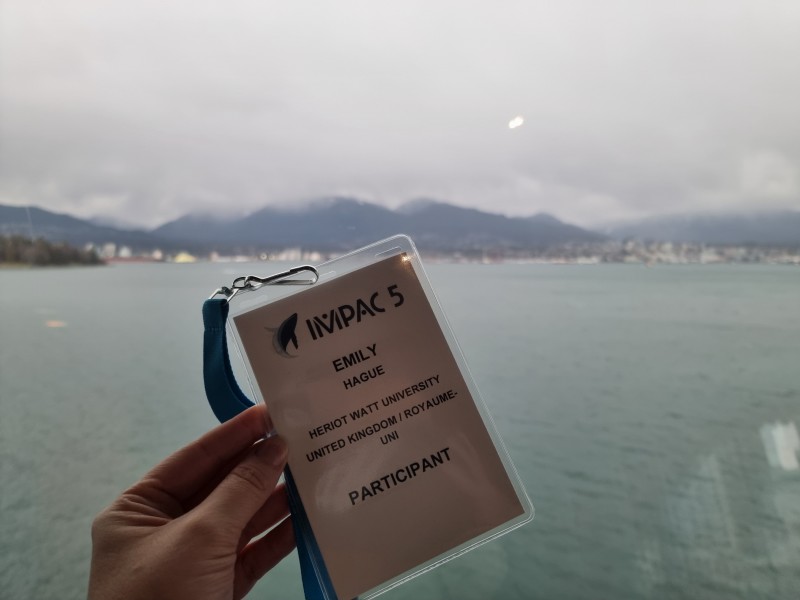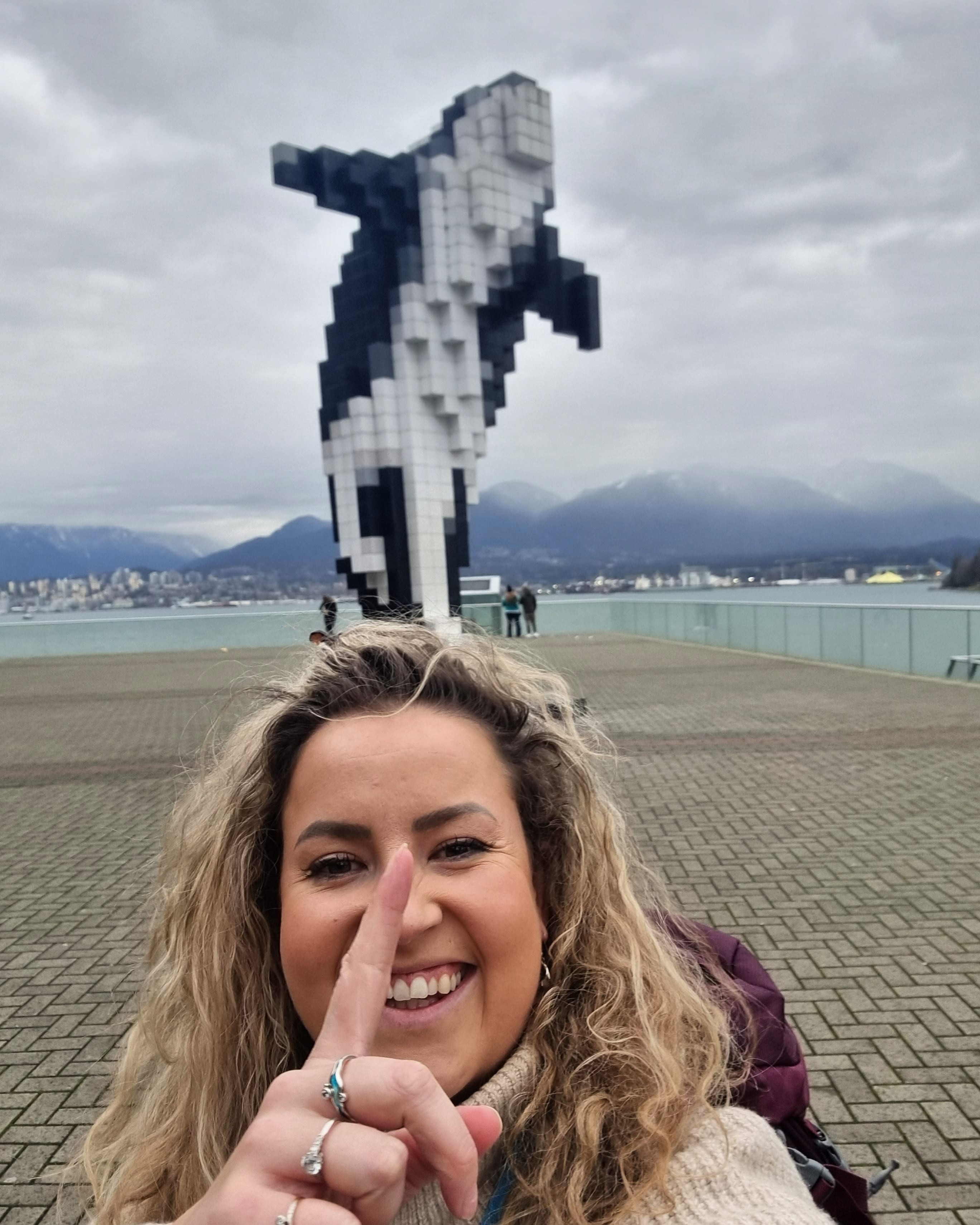International Marine Protected Areas Congress (IMPAC5)
Emily Hague
Heriot-Watt University

My participant pass for the IMPAC5 Congress, taken whilst looking out of the congress venue (Vancouver Convention Centre) over Burrard Inlet and Vancouver Harbour, towards North Vancouver. Fantastic venue and views!
In February 2023, with help from the Challenger Society for Marine Science Travel Award, I travelled almost 5000 miles from Scotland over to Vancouver Canada, to attend the Fifth International Marine Protected Areas Congress (IMPAC5), a global forum that brought together ocean conservation professionals and high-level officials to inform, inspire and act on marine protected areas. During the 6-day congress, I was inspired and moved listening to a variety of incredible keynote speakers, including talks from marine biologists, photographers, videographers, academics and representatives of the indigenous First Nation communities. I also really enjoyed attending the variety of sessions scheduled each day, which included talks and workshops focusing on various themes and topics important to collectively working together to improve ocean protection. Throughout the conference, I took full advantage of the networking opportunities that arose from having 3000 ocean professionals within the same space – and met and connected with many scientists, practitioners and interested parties from a variety of backgrounds and disciplines, who are all working tirelessly towards a common goal of improved ocean protection. During the ‘Managing Marine Protected Areas and Human Activity’ session, I was delighted to have the opportunity to present some of my own PhD research relevant to the congress topic, and presented a talk titled ‘Same species, same space, different practice: reviewing the non-uniformity in assessment of cumulative impacts to marine mammals’. I received great feedback and questions following my talk and am really pleased to have been able to present my UK-based research to an international platform. If you’re interested in this work, you can check out the published paper in Frontiers in Marine Science here https://doi.org/10.3389/fmars.2022.822467
Checking out the Digital Orca, by Douglas Coupland, which is situated right outside the Vancouver Convention Centre.
Following the conference, I then remained in British Columbia (BC) for a further three weeks, to fully utilise the opportunity of being able to meet in-person with like-minded marine researchers based in BC who are working on similar and complementary topics to my own PhD research. I travelled around Vancouver itself to meet with representatives from Ocean Wise, the Port of Vancouver, and SMRU Consulting North America, and then spent the remaining time on Vancouver Island attending preorganised meetings with over 20 researchers across a variety of organisations, including the University of Victoria (UVic), Transport Canada, Ocean Wise, the Department of Fisheries and Oceans, Marine Education Research Society, the Institute of Ocean Sciences, Simon Fraser University and Environment and Climate Change Canada. Alongside some really productive one-on-one meetings where we discussed common research interests and identified future collaborative opportunities, I also gave further talks on my research, providing a 1-hr seminar on my research as part of the Institute of Ocean Sciences seminar series, and also gave a 30-min talk on my current studies to a research lab at UVic. Meeting with such a multitude of organisations and researchers allowed me to simultaneously expand my network of research contacts whilst also introducing them to my own research interests. This allowed for rich discussions on the potential for building future UK-Canada collaborations, and will be invaluable to my career progression post-PhD. I have now returned to my studies in Scotland feeling reinvigorated, and excited and energised to proceed with developing a strong Fellowship application founded on the ideas and new collaborations developed during my time at IMPAC5 and whilst travelling around BC. 
Profile:
I am Emily Hague, a PhD researcher based at Heriot-Watt University, primarily supervised by Dr Lauren McWhinnie. My research focuses on better understanding cumulative impacts to marine mammals, with a focus on UK seas, and I have a special research interest in the impacts of vessels (check out the project I lead: The Scottish Vessel Project).
Latest News
Royal Society Publishing Photography Competition 2025
Please see a message from the Royal Society below:
We are delighted to announce that the 2025 Competition is now open for entries until 15 August for a chance to win £1000! The competition celebrates the power of photography in conveying the wonder of science happening all around us and photographs can be submitted in the categories of: Astronomy, Behaviour, Earth Science and Climatology, Ecology and Environmental Science, and Microimaging.
The competition is free to enter and open to anyone studying or working in science at graduate level or above. Category winners will receive a one-year membership to the Royal Photographic Society and the overall winner will receive a grand prize of £1,000. Find out more: https://bit.ly/RSPphotocomp
October 2025 MEDIN Workshop: Marine Data Management, Governance and the MEDIN toolset
The Marine Environmental Data and Information Network (MEDIN) are pleased to announce that registration is now open for the next occurrence of our popular free online training workshop: ‘Marine Data Management, Governance and the MEDIN toolset’ on the 13th – 17th October 2025 on OceanTeacher Global Academy.
Marine Data Management, Governance and the MEDIN toolset
The Marine Environmental Data and Information Network (MEDIN) and OceanWise are delighted to invite you to attend our popular free online training workshop: ‘Marine Data Management, Governance and the MEDIN toolset’ on the 19th – 23rd of May 2025.
